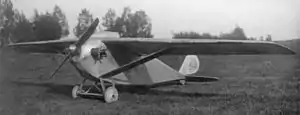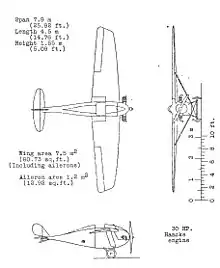| Dobi-I | |
|---|---|
 | |
| Role | Experimental aircraft |
| National origin | Lithuania |
| Designer | Jurgis Dobkevičius |
| First flight | 1922 |
| Retired | 1925 |
| Status | Retired |
The Dobi-I was designed by Lithuanian aviator Jurgis Dobkevičius and the first airplane of Lithuanian design.[1][2] Jurgis Dobkevičius started designing and building Dobi-I in 1921, and it was first tested by its designer in July 1922. The single Dobi-I prototype was damaged beyond repair in an accident on 1 December 1925.
Specifications

Dobi-I 3-view drawing from NACA-TM-301
Data from Les Ailes March 1924[2]
General characteristics
- Crew: One
- Length: 4.50 m (14 ft 9 in)
- Wingspan: 7.90 m (25 ft 11 in)
- Wing area: 7.50 m2 (80.7 sq ft)
- Empty weight: 167 kg (368 lb)
- Gross weight: 295 kg (650 lb)
- Fuel capacity: 60 L (13 imp gal; 16 US gal)
- Powerplant: 1 × Haacke HFM-2 flat twin, 22 kW (30 hp)
- Propellers: 2-bladed
Performance
See also
References
- 1 2 3 "Dobi-I". Archived from the original on 1 September 2004. Retrieved 27 January 2017.
- 1 2 Serryer, J (13 March 1924). "Les avions Dobkevicius". Les Ailes (143): 2–3.
Wikimedia Commons has media related to Dobi-I.
This article is issued from Wikipedia. The text is licensed under Creative Commons - Attribution - Sharealike. Additional terms may apply for the media files.